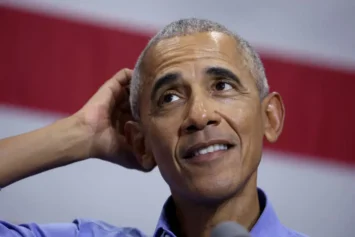President Barack Obama’s uncle was arrested on drunk driving charges last year and now faces a third deportation hearing after an appeals board ordered the agency running the U.S. immigration court system to review his case.
Onyango Obama, the half-brother of the president’s late father, is from Kenya, but has lived in the United States for decades. He was ordered by an immigration judge to leave the U.S. in 1992 after failing to renew an application to remain. He later sought to reverse the deportation order.
The Board of Immigration Appeals has sent Obama’s case to the Executive Office for Immigration Review for reassessment, U.S. Immigration and Customs Enforcement spokesman Brian Hale said Tuesday, declining to discuss the reasoning behind the decision to the Associated Press.
Obama’s Cleveland-based attorney, P. Scott Bratton, didn’t immediately return a phone call seeking comment. An Executive Office for Immigration Review spokeswoman wouldn’t comment, citing privacy laws.
Bratton previously said Obama’s deportation order was caused by a technical error. He said Obama, 68, moved to the United States as a teenager in the early 1960s to live with a host family and attend school.
He was supposed to return to Kenya by Dec. 24, 1970, according to records obtained by the Boston Globe.
Instead, Obama worked from 1973 to September 1984, when immigration officials found him, according to the court’s decision. In 1989, the judge again ordered him deported, and three years later the Board of Immigration Appeals dismissed his appeal.
Obama’s sister, Zeituni Onyango, the president’s aunt, made headlines in 2010 when she won asylum in the United States following an earlier deportation order.
The president, in his memoir “Dreams from My Father,” writes about retracing his roots and his 1988 trip to Kenya and refers to an Uncle Omar, who matches Onyango Obama’s background and has the same date of birth.
Obama’s immigration woes emerged after he was arrested last year in Framingham, just west of Boston, and charged with drunken driving. A police officer said Obama failed to stop at a stop sign and nearly caused the officer’s cruiser to crash into his vehicle.
Obama admitted sufficient facts in the case, meaning he didn’t plead guilty, but acknowledged prosecutors had enough evidence to convict him.
A judge continued the case for one year without a finding, meaning the charge would be dismissed if Obama doesn’t get arrested during that time. The judge also ordered him to attend a driver alcohol education program.
Following his arrest in the driving case, Obama was asked if he wanted to make a phone call to arrange for bail, said, “I think I will call the White House,” according to a police report. But he has had no contact with the White House about the case, his lawyer said.
The White House said it expected his arrest to be handled like any other, but critics are alleging otherwise.
But other immigration lawyers interviewed by the Globe said the fact that Obama is related to the president poses a serious threat if he is returned to Kenya.
“Anyone who’s related to the president of the United States technically is at risk,” said Boston lawyer Matthew Maiona.


